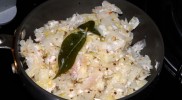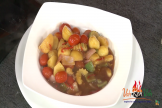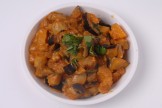
Cabbage foogath is a simple stiry fry curry dish, cabbage mildly spiced, flavoured with c...

These are easy sweet potato fritters have a crispy crust and a tender middle roasted vege...

Gutti Vankaya Kura or Stuffed Eggplant/Brinjal curry is Andhra traditional special. Eggpl...

A different combination of brinjal and mango curry. It goes excellent with roti or pulka...
Delicious bitter melon curry to serve as a side dish flavoured with coconut, tamarind and...
Potatoes cauliflower green peas curry with tomato gravy with minimal oil is used. Serve h...
Mutton rogan josh is a world famous Indian delicacy which is native to Kashmir. This signature Kashmiri non-vegetarian recipe makes your meal even more special with exceptional flavors to relish.
Mutton Rogan Josh is scrumptious delicacy from the Kashmiri cuisine distinguished by its thick, aromatic, flavourful red sauce and tender meat. Most people attribute this dish to the Kashmiri region but few say that it was actually introduced to the Kashmiri people by the Moghuls.
Rogan nam... Read More..
About Recipe
Kashmiri mamsamu koora, Attiraichi Kuzhambu ratan jog, Vera mangso rogan josh |
|||||||||||||||||||||||||||||||||||||||||||||
|
|||||||||||||||||||||||||||||||||||||||||||||
Mutton Rogan Josh is scrumptious delicacy from the Kashmiri cuisine distinguished by its thick, aromatic, flavourful red sauce and tender meat. Most people attribute this dish to the Kashmiri region but few say that it was actually introduced to the Kashmiri people by the Moghuls.
Rogan name translates to clarified butter or oil in Persian, referring to the way the meat and spices are cooked while Josh means fiery or hot referring the dish’s deep red color. This is a wonderful type of lamb curry which is slowly cooked with a selection of fragrant spices, the most important being the ‘Kashmiri peppers’ as it gives a distinct red color to the dish while keeping it milder compared to other Indian curries.
History states that this dish originated from Persia and was popularized by the Mughals in India. Despite its intense and vibrant red hue, this dish is not a fiery curry and remains a common and popular dish in northern India and popular menu item at most Indian restaurants.
This dish traditionally consists of lamb or goat meat which has been slow cooked in an amalgamation of yogurt and a mix of many flavourful spices. Due to the popularity of this dish and rarity of Kashmiri chilies, there are many versions where saffron, tomatoes and other types of chilies or paprika is used to achieve the RoganJosh red color.In spite of including a lot of spices, the dish is not really hot compared to others.
Mutton Rogan Josh is best paired with basmati rice or freshly baked naan. Rogan josh is creamy, rich, spicy, aromatic meat dish has its origin in Mughal cuisine, one of the largest Muslim influences in India. The authentic Kashmiri Rogan Josh curry is prepared with lamb or mutton shoulder, cooked to a tender, succulent texture in a gorgeously rich sauce packed with flavors.
Traditionally the dish is prepared in ghee, with the spices fried in fat to stimulate flavors and infuse the fat with the essence before adding other ingredients. Yogurt, the base for the sauce, gives a lovely tang together with the tomato while almonds add texture, flavor and also thickens the sauce. The mild heat from the chilies and pepper to compliments the dish.
All in all, this dish has reminiscent flavors that we are to die for.For this glorious stupendous delicacy, guilty pleasure, serve rogan josh with any flat Indian bread like chappati, paratha, naan—the perfect choices for mopping up the rich gravy.
Importance of Kashmiri red chilies Whole dried Kashmiri red chilies is the best ingredient to flavor a variety of Indian dishes as the food get less spicy and emanates a rich and alluring color. Most Indian recipes are necessarily pepped up with these aromatic chilies. Soaked red chilies are best used in gravies and dry dishes. They just need to soaked in hot water (remove the stems and seeds) and rested for 30 minutes, drain and use as per the requirement.
Though there are an innumerable variety of red chilies in the market, the Kashmiri red chilies are always the best which have bright red color with high retention. They are also less pungent in nature and having the ability to give a rich red color to flavor Shahi gravies and curries. Kashmiri red chilies are added to various marinades and preparation for making veg and chicken dishes.
The roasted Kashmiri chilies have a unique and exotic aroma that spreads immediately when roasted on hot tawa or in the oven. These chilies offer their best while making tomato sauces, soups, stews etc. Kashmiri red chilies contain a good amount of vitamin C and vitamin A which is necessary to boost the immune system of the body. It has vitamins B and E which are the ultimate source of low fat and low cholesterol.
Kashmiri cuisine History states that the modern Kashmiri cuisine was traced back to the 15th-century invasion of India by Timur, and the migration of 1700 skilled woodcarvers, weavers, architects, calligraphers and cooks from Samarkand to the valley of Kashmir.
The descendants of these cooks, the Wazas, are the master chefs of Kashmir. Wazwan is considered to be the ultimate formal banquet in Kashmiri comprising of a thirty-six-course meal, out of which between fifteen to thirty are meat preparations cooked overnight by the master chefs and his assistance.
Traditionally the guest coming to the banquets are seated in groups of four sharing a large metal plated called the Trami. The trami is filled with heaps of rice, quartered with four seekh kebabs and contains pieces of methi korma, tabak maaz, safed murg and zafrani murg and first few courses.
The curd and chutney are served separately in small earthen pots. The other seven important dishes which are a must for these occasions are Rista, Rogan Josh, Tabak Maaz, Daniwal Korma, Aab Gosht, Marchwangan Korma, and Gushtaba. The meal ends with theGushtaba. Other popular dishes from the Kashmiri cuisine are Yakhni, Lamb curry, Dum aloo, Kashmiri pulao, and Kahwa chai (Kashmiri green tea).

Paul Kern, PMP Posted on Sun Feb 11 2018
I am so happy to have found this Vah-Chef recipe, a 5 of 5 if you make one small but very important adjustment to greatly reduce the Hing/Asafoetida. Here is what went so very well, making this exactly as the recipe said: 1.) the color was such a br
Reply 0 - Replies
Rowena Low Posted on Mon Jan 13 2014
This looks so delicious! What vegetable dish / chutney would you pair with this? Thank you!
Reply 0 - Replies
Posted on Mon Jan 13 2014
Kindly let me know how to prepare this recipe in the cooker method and when to add the coarse powder and how long to leave it to cook.
Reply 0 - Replies Easy recipes
Easy recipes
 Healthy Recipes
Healthy Recipes
 Dessert Recipes
Dessert Recipes
 Mutton and Lamb
Mutton and Lamb  Indian Bread Recipes
Indian Bread Recipes
 Dal Recipes
Dal Recipes
 Chutney and Pickles
Chutney and Pickles  Indo-Chinese Recipes
Indo-Chinese Recipes
 Snacks and Appetizers
Snacks and Appetizers
 Low Fat Recipes
Low Fat Recipes
 Chaat Recipes
Chaat Recipes
 Biryani and Rice
Biryani and Rice  Curry Recipes
Curry Recipes
 Indian Sweet Recipes
Indian Sweet Recipes
 Egg Recipes
Egg Recipes
 Paneer Recipes
Paneer Recipes
 Chicken Recipes
Chicken Recipes
 Indian tiffins
Indian tiffins
 Egg less Recipes
Egg less Recipes
 Soups and Salads
Soups and Salads
 Indian Sea Food
Indian Sea Food
 Manchurian Recipes
Manchurian Recipes
 Indian Drinks Recipes
Indian Drinks Recipes
 Dinner Recipes
Dinner Recipes
Paul Kern, PMP Posted on Mon Feb 12 2018
I think a typo was made: the two references to ingredient 'Maize' should instead say Mace (Javitri).
Reply 0 - Replies